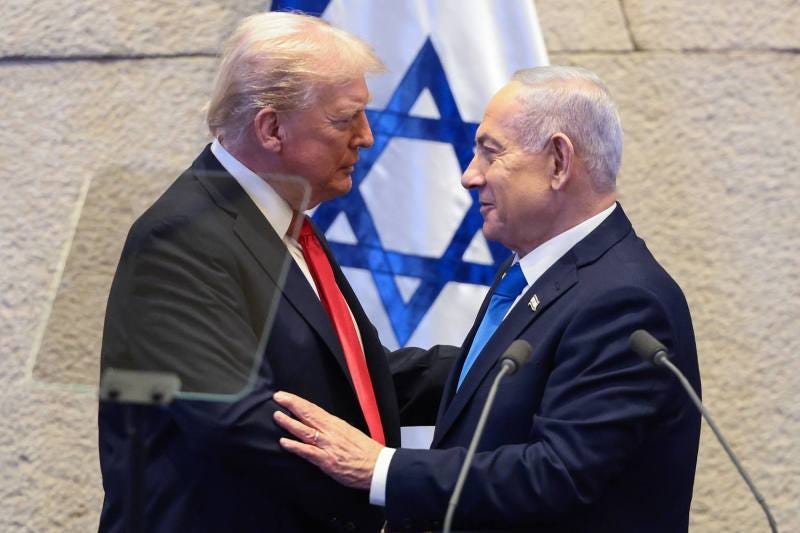The Emperor's New Diplomacy
How To Create Reality
Catch-up service:
Podcast: Jemima Kelly on the radical right
Successful Politicians Are Pattern-Breakers
Is Civility a Fantasy?
A Studio 54 Immigration Policy
10 Ways To Buy Happiness
Suicide as a Bargaining Tactic
Christmas is coming and I need hardly tell you that John & Paul makes an excellent present. My UK publisher has produced a lovely gold edition just for this purpose. If you’d like to get a signed and dedicated gold copy, order from this wonderful independent bookstore and they’ll ship it to you in November.
Of course, Ruffian members who pay the top, founding member rate (£90 per year) can get a signed copy for free (I can’t guarantee it will be a gold one, that depends on what I have). If you’d like one, take out a subscription or upgrade your existing one, then hit reply and let me know your address. Oh and this is what Ethan Hawke says:
Right, on with the show…
In 2002, as America was building a case for invading Iraq, a reporter called Ron Suskind elicited a striking quote from an unnamed adviser to President George W. Bush (widely believed to have been Karl Rove):
“The aide said that guys like me were ‘in what we call the reality-based community,’ which he defined as people who ‘believe that solutions emerge from your judicious study of discernible reality.’ [...] ‘That’s not the way the world really works anymore,’ he continued. ‘We’re an empire now, and when we act, we create our own reality.”
This quote first saw the light of day in 2004, in the New York Times, by which point it was clear that the the Bush administration’s narrative of the Iraq war had smashed into a reality which bore little relation to it. The phrase “reality-based community” subsequently became so notorious that it has its own Wikipedia entry, where it is defined as “a derisive term for people who base judgments on facts.” Rove, or whoever it was, now looks to have been in the grip of hubristic delusion.
After Trump’s decisive intervention in the Israel-Hamas conflict, however, I’ve started to wonder if there wasn’t at least a half-truth to those words. Here is the veteran Israeli peace negotiator Gershon Baskin describing what happened in the last two weeks:
“Trump made it real. There’s a new way of working in the world of diplomacy today. You create reality. Trump put it on his Truth Social: “The war is over”. Netanyahu agreed. That’s it! Trump created the reality where Israel could not say no.”
Having bullied Netanyahu into saying yes, Trump did the same to Hamas. According to Baskin, Trump announced Hamas’s consent to the deal before Hamas actually said yes, then brought in Turkey to ensure the ‘yes’ stuck.”1
Speaking on the Unholy podcast, the British Jewish journalist Jonathan Freedland described being in two minds while watching Trump’s victory lap in Jerusalem and Sharm el-Sheikh. On the one hand he found it ridiculous that Trump was selling a mere ceasefire deal as the resolution of the entire, three-thousand-year-old Arab-Israeli conflict, and that all these leaders were playing along with the pretence. “They’re all cheering him and pretending he’s actually solved the real conflict—all those complicated issues of refugees and Jerusalem and right of return…And I’m thinking this is emperor’s new clothes, because he’s done none of that.”
But then, as he watched, Freedland started to have a second thought - that this is exactly how Trump gets things done. “Fake it till you make it. It’s actually a brilliant technique. It’s one he’s done all his life—if you keep telling everyone this has happened, maybe it then happens.” If the emperor can make everyone agree with him about his magnificent clothes, then he is wearing them.
This is similar to the approach described by Rove’s quote. It’s why Trump can be a chaotic and destructive leader and, in the right circumstance, a force for positive, even transformational change. The way in which this peace deal came about shows us how technology is reshaping diplomacy, and it also points to something bigger: a fundamental shift in our relationship to reality.
After the jump: I explain what the hell I mean by that, plus a glorious Rattle Bag of good things to read, watch and listen to. Paid subscribers make The Ruffian possible - thank you to all of you who have already signed up.






